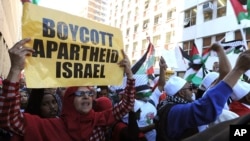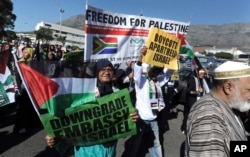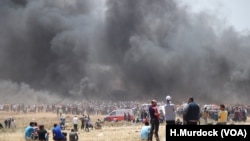South Africa recalled its ambassador from Israel on Tuesday, after Israeli forces killed around Palestinians 60 protesters during demonstrations against the U.S. embassy's move from Tel Aviv to the disputed city of Jerusalem.
South Africa’s Department of International Relations and Cooperation condemned the actions of Israeli forces against pro-Palestinian protesters in Gaza, saying, “The victims were taking part in a peaceful protest against the provocative inauguration of the U.S. embassy in Jerusalem.”
That violence, said the department, prompted South Africa to immediately withdraw its ambassador from Tel Aviv, where most foreign embassies in Israel are based.
“As we have stated on previous occasions, South Africa reiterates its view that the Israeli Defense Forces must withdraw from the Gaza Strip and bring to an end the violent and destructive incursions into Palestinian territories,” the statement said. “South Africa maintains further that the violence in the Gaza Strip will stand in the way of rebuilding Palestinian institutions and infrastructure.”
The move was welcomed by the 100 or so protesters who gathered outside the United States consulate in Johannesburg on Tuesday.
‘Taking a stand’
Among the protesters — many of whom wore shirts that read, “Free Palestine” and “End Israeli Apartheid” — was a small group of people who identified themselves as members of a group called South African Jews for a Free Palestine.
“It is a really important move for South Africa to start taking a stand,” said a young woman, Rosa, who asked that we not use her full name but who other protesters confirmed is a member of the group.
“South Africa, you know, was crippled by apartheid, and as Nelson Mandela said, ‘South Africa cannot be free until Palestine is free.’
"And I think it’s really important that the South African government is hearing the voices of the people who are saying, ‘We can’t just watch, we can’t just let children get murdered, we can’t let civilians get murdered,’ and this is, I guess, a small symbolic gesture where they’re starting to do something."
The South African Jewish Board of Deputies, a much larger group, disagreed in a joint statement with the SA Zionist Federation.
Wendy Kahn, national director of the Board of Deputies, said the group was “disappointed” by the ambassador’s withdrawal.
“We believe that nothing can be achieved by shutting down a diplomatic channel,” she told VOA. “South Africa has a history of negotiation and dialogue and we believe that in so many ways they could have played a role in resolving this really awful conflict.”
Africa-Israel tensions
South Africa’s reaction is the strongest to come out of the continent. But it is not new, or surprising, says analyst Alfred Majaye Dube of the Institute for Security Studies. The divide, he says, dates back to the Arab-Israeli wars in the 1960s and 70s, which coincided with the early days of independence for many African nations.
“I think as the years passed, Africa’s position on decolonization was very clear, and therefore by extension there was a very strong feeling that Israel was in violation of various resolutions of the United Nations in terms of the occupied territories,” he told VOA from Addis Ababa, Ethiopia.
“And therefore, a resolution of the Organization of African Unity was that African states would not have diplomatic relations, or those that had would break relations with Israel over the question of the occupied territories.”
That stance persists. Today, Israel has just 11 embassies on a continent of 54 countries. And the African Union has admitted the Arab League as the only non-African member state, and allows the body to address the bloc at its annual summit.
And, when the United Nations voted overwhelmingly last year to reject the United States’ move to recognize Jerusalem as the Israeli capital, only one African state - the tiny West African nation of Togo - voted with the United States and Israel.
President Donald Trump, who initiated the embassy move, tweeted Monday that the opening of the new mission in Jerusalem represents "A great day for Israel."






